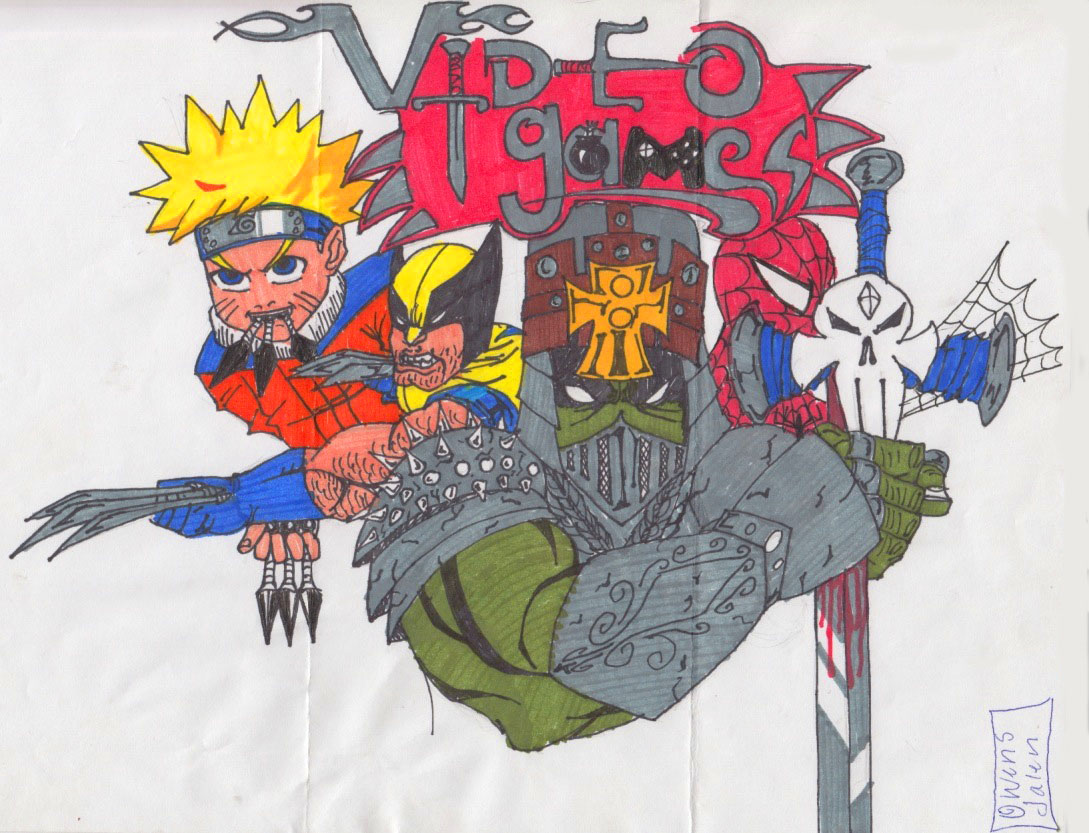
art by Jalen Owens

Karen James wrote on facebook in 2012:
My nine-year-old son ran into the kitchen yesterday while I was fixing a snack for us to take back to our game of Minecraft saying he had finally figured out how to make a "logic gate" using redstone. He was jumping up and down, so thrilled with his accomplishment. I wasn't even sure what a logic gate was, nor how to make one. We quickly returned to the game where he proceeded to educate me by building trap after trap for me to trip, and invention after invention to me to use, all using this new skill he figured out. We played for over two hours together, at which point he stopped and said he wanted to see if his friend was available to play out back with him. I stayed at the game for a bit, building, and trying to figure out what he had done 😉
A good chunk of our days are filled with gaming, and I wouldn't change a moment of it. My son is learning so much, is healthy both physically and emotionally, and truly loves his life. What more could I hope for?! (And, BTW, inviting media into our lives was a stretch for me at first too. I know the fears. I read all the studies. But after a few years of living this life, I also know my fears were unfounded. But as Alexandra and Sandra say...don't go too fast. You'll see more. Enjoy the new landscape!)
The discussion of video games begins about 20:40. [Before that was about deschooling—also important, and a bit about games.]
Here's How You'll Get Smarter By Playing Video Games from Business Insider, 1/17/12
Lyla Wolfenstein brought this link to unschoolers' attention, and though it's not about unschoolers, the stories are interesting and the angle on the games is different.
"...They were using the scientific method. They'd think of a hypothesis—This boss is really susceptible to fire spells—and then collect evidence to see if the hypothesis was correct. If it wasn't, they'd improve it until it accounted for the observed data.This led Steinkuehler to a fascinating and provocative conclusion: Videogames are becoming the new hotbed of scientific thinking for kids today.
Read More
"Video games are hard,'' said Eric Klopfer, the director of MIT's Education Arcade, which studies and develops educational video games. "People don't like to play easy games, and games have figured out a way to encourage players to persist at solving challenging problems.''Q and A with a Video Game DesignerThe games aren't just hard - they're adaptively hard. They tend to challenge people right at the edge of their abilities; as players get better and score more points, they move up to more demanding levels of play. This adaptive challenge is "stunningly powerful'' for learning, said John Gabrieli, a neuroscientist at MIT.
Got a son who plays video games all day long? He just might grow up to be a video game designer! That's exactly what happened to my brother, Greg Wondra, now a video game designer with Zindagi Games. That's him above -- with Derek Jeter, cover athlete for 2K7 Major League Baseball. I talked to Greg about life as a video game designer:World of Warcraft: What can be learned?
chat transcript with links and photos, including a larger image of Michelle at Blizzcon

The door closes with a squeak and a creak. Oh no! Is it locked? Let’s check… No, thank God, you can open it… So now, another go at getting to the ladder. Maybe through this narrow hallway? … No, it’s a dead end"...
Quotes *me*!: "The Problem and a Solution," by Zach Sanders
|
Amy wrote: Hi all, Steven Johnson has an article in the July 2005 Discover magazine about the amazing learning that goes in in video games, as well as some recommendations for good video games. (Johnson is the author of the book Everything Bad is Good for You, which is apparently debunking myths about TV, video games, and so on.)
You can probably find Discover at your library, or you can access the
article here: You can read the full article by becoming a Discover.com member for free and then paying $1.00 for the article. My favorite moment in the article is when the author is showing his seven-year-old nephew the SimCity neighborhood that he built. When the author notes that he's having problem getting a certain area with factories to come back to life, the boy turns to him and says, "I think you need to lower your industrial tax rates." Yeow.
Peace, |
Joyce
"Okay, if you have been living under a rock or something, you may not know that the long-awaited Super Smash Bros.' Brawl for the Wii was released Saturday night at midnight. In this house, it was an Event. Gamestops across the country sponsored tournaments. I signed the boys up for the tournament near us last week, and there was only one other name on the list at the local Gamestop. A tournament of three, I thought. This should go quickly... read more (and there's a link to the game's site there)
"One of my kids sent me a link to a game he is interested in. "I hadn't heard of it before, but it looks VERY cool, and since I was right there on your site at the time, I wondered if your kids play it. And if they don't, they might want to know about it."Portal (at orange.half-life2)
Be sure to watch the trailer.
How can the greater cognitive demands that television makes on us now, he wonders, not matter?You Play World of Warcraft? You're Hired! This quote from the article sounds just like unschooling:Johnson develops the same argument about video games. Most of the people who denounce video games, he says, haven’t actually played them...
Gaming tends to be regarded as a harmless diversion at best, a vile corruptor of youth at worst. But the usual critiques fail to recognize its potential for experiential learning. Unlike education acquired through textbooks, lectures, and classroom instruction, what takes place in massively multiplayer online games is what we call accidental learning. It's learning to be - a natural byproduct of adjusting to a new culture - as opposed to learning about.
Marc Prensky (link supplied by Bob Collier; thanks!)
"Marc's new book, DON'T BOTHER ME, MOM—I'M LEARNING : How Computer and Video Games Are Preparing Your Kids For Twenty-first Century Success—and How You Can Help! ....."
Proposed Video-Game School Gets $1.1 Million Boost
The MacArthur Foundation board announced Thursday it will fund a $1.1 million grant for a brand new middle- and high school in New York. The curriculum revolves around teaching kids to make video games.The MacArthur Foundation says video games and the dynamic systems they use will be key to information management in the future.
Heather Chaplin reports on the new idea of gaming literacy. —thanks to Alyse for this link
Everything Bad is Good for You: How Today's Popular Culture is Actually Making us Smarter by Steve Johnson, and a New Yorker review of the book.
The Guardian had an article in this morning [10/27/04] about how London
University's Institute for Education has found computer/video games
to be good educational tools for children. Here's the site
Computer games 'can help children learn'
[Thanks to Schuyler for this, and when/if the link is no longer current, someone please e-mail me.]
I saw this, and it's about the tightest, best documentary I've seen in my life. I ordered it on DVD immediately. (—Sandra)
High Score Education: Games, not school, are teaching kids to think. (by James Paul Gee, on Wired site.)
Cutting-Edge Art and Music in Video Game Production (excerpts from and links to two articles from March 2004)
Do Video Games Affect Kids, Really?
Most of this page grew out of that presentation, and the beginning of the gathering of our defense of those who are not afraid of Children who Play Video Games.
One of the best online articles for homeschoolers and parents is Kathy Ward's article on video games. Kathy has eight children, once limited gaming time and access, and decided over the years not to do so anymore. She has a child who compensated for dyslexia and learned to read, with the help of video games. (Sorry that article is temporarily unavailable.)
"If You Give a Kid a Nintendo..."
Kandie Demarest has an autistic son, and wrote an article about his experiences called VIDEO GAMES - What are they good for?
After hearing part of the tape of the workshop, Marty Dodd and Jeremy Oat rattled off a list of video games with female leads for your consideration, and additions are welcome. (Some have been sent already by other readers and added—thank you!!)
Here are several testimonials:
- from parents and gamers or both.
- "The amount of problem solving that my kids go through while playing is incredible." (Stephanie E's account of Game Cube and her young sons)
- A boy named Ryan Smith has sent a note and a poem in defense of games.
Stories of video games helping kids learn to read: Reading from Videogames
If games are too difficult or you're stuck, there are online sources of information. Also on Making Games Easier, Dan Vilter comments on working through frustration.
Renowned comic-book author Gerard Jones argues that bloody videogames, gun-glorifying gangsta rap and other forms of 'creative violence' help far more children than they hurt, by giving kids a tool to master their rage. Is he insightful, or insane?
"I thought you might enjoy Zach's blog. He writes about his passion - video games. Zach is fifteen and has been radically unschooled for three years." (written in early 2007)
—Chris in IA (Zamozo)
The writing there is exceptional. I read about games I'd never even heard of, and was swept up in the reviews. The internet might be full of well-written walk-throughs and reviews, but any parents worried about whether a child could learn to write without English classes should go to that blog, or to Gina's writing, below. —Sandra
Gina Trujillo's love of Sonic led to art, writing and webpage design. You'll be impressed with Flipside Element. A sample of Gina's art:

High Score Education: Games, not school, are teaching kids to think. by James Paul Gee, a reading professor at the University of Wisconsin-Madison, the author of What Video Games Have to Teach Us About Learning and Literacy.
The University of Bristol presents: "New research shows benefits of playing computer games". "The research, which gathered information from teachers, parents and pupils, shows that children learn a range of strategic thinking and planning skills that teachers find beneficial to their pupils' learning."Archived copy (in case the newer one above disappears)
|
Dear Mrs. Sandra Dodd, Thank you for your page on videogames and their many benefits. I am a long-time avid gamer; I've loved games ever since I got my very first NES. While some may believe that games will "rot your brain," I'm living proof to the contrary. I'm now 23, and I still play games. However, in the meantime, I have graduated high school with honors and a National Honors Society member. I've earned a Bachelor of Science degree in computer science and engineering, cum laude. I'm currently enrolled in law school, and doing quite well. I personally attribute a lot of my academic success to video games, and always have. One important lesson I've learned is how to budget my time effectively. Video games also serve as an important release from the stress created by such rigorous study. Also, I believe each and every game teaches important educational concepts indirectly (e.g. reading comprehension, logic and mathematics through puzzle solving, hand-eye coordination, etc.). I'm very supportive of parents who get gaming systems for their kids, and I hate it when I hear how games are "destroying" our youth. I hope many parents read your page and make use of it!
Thanks again, I totally agree with him about the stress reduction, too. A benefit I hadn't really thought about for a while—in fact, I had forgotten how my husband and I played videogames (Galaga, Centipedes, PacMan, etc.) for hours and hours in the student center at USC, when we were both in grad school there. That was definitely stress reduction therapy!! —Pam Sorooshian |
An interview concerning Ratings for Video Games is at the Family Education site. Here is an excerpt:
The majority of our market is over 18. By the way, only 7 percent of all video games carry the “mature” (suitable for 17 and older) rating. As for the government, we don’t tolerate the idea of the government regulating books. This is no different.Q: But many people would argue that the video game experience is much more intense for kids than the experience of reading a book, and therefore should be regulated.
A: There is absolutely no research to support the idea that playing a violent video game leads to violent behavior. That’s the first point I’d like to make. The second is that with regard to books – who is to say that someone who reads a lurid crime novel won’t take away ideas. You can learn how to make a bomb by reading a book. But look – the crime rate is going down at the same time the use of video games is exploding. Finally, what we’re talking about here is a game. It’s entertainment.
Video Games and Children by Bernard Cesarone
cites studies and gives statistics (for those readers who like such things) but is probably nearly a decade old. Some comments are outdated, such as this: "The world of video games has little sense of community and few team players. Also, most video games do not allow play by more than one player at a time." Still, the closing comment is this:
"Given inconclusive research, recommendations concerning video games must be conservative. According to researcher Jeanne Funk (1993), a ban on video games is:
..."probably not ... in the child's best interests. Limiting playing time and monitoring game selection according to developmental level and game content may be as important as similar parental management of television privileges. Parents and professionals should also seek creative ways to increase the acceptance, popularity, and availability of games that are relatively prosocial, educational, and fun." (p.89)
12 Great Video Games With Ridiculous Premises (very fun article)
Red vs. Blue Halo and Halo II humor (now on youtube)
Super Mario Brothers analyzed as Communist Propaganda
Video-Game Characters Denounce Randomly Placed Swinging Blades
"When Vice City is released on Oct. 29, it will freak out millions of parents and sell millions of copies, but it will also force us to realize that video games aren't toys anymore; they're sophisticated, thought-provoking entertainment for grownups. At their best, they're art."
As for the violence, Vice City doesn't pull any punches — but why should it? Studies show the average American gamer is well into his 20s . . . . "There has been a demographic shift in who's playing," Donovan argues. "You're telling a 25-year-old that he's supposed to play with a hedgehog?"
[quotes from recent Time Magazine article on Grand Theft Auto III.]
Games * Design * Art * Culture is largely about online games, but has links to design-related sites and articles. For those more interested in how games come to be, who designs them, and so forth this site will be of interest.

NEWER: Amazing orchestral stuff by Jeremy Soule and Nobuo Uematsu, and some commentary, and links, and videos...

